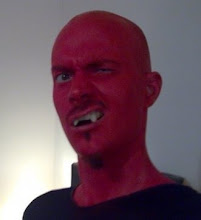Dawn
of the Planet of the Apes
Sequel
to the re-boot, we return to San Francisco years after an ape-borne plague has
wiped out much of human life, and the apes who fled the city have forged
themselves a neat little civilization in the forest.
A
fairly heavy-handed anti-war allegory with brilliant CGI, Dawn relies on the plot
twist of there always being one trigger happy idiot who ruins things, a premise
that would be a lot harder to believe anywhere outside the USA.
Still,
an accidental meeting in the forest as survivors look for an abandoned
hydro-power plant leads to an ape being shot, and humans and apes eventually
facing off as the wise Caesar from the first film is usurped by the twisted
Koba (who has been twisted and scarred from his treatment by humans, the films
is at pains to point out).
The
apes steal from the human’s weapon cache and take over what remains of the
city, enslaving captured humans until Caesar returns and reasserts his place as
leader amidst a big clash atop a crumbling tower, as you do.
Not
as groundbreaking as Rise, but a decent film in and of itself with fairly good
turns by Jason Clarke, Keri Russell and Gary Oldman
King
of Pigs
The
tale of friends at a Korean school where the kids of the rich rule the
classrooms with violence and humiliation, but as two friends are bullied, an
outsider fights back and forms an uneasy alliance with them.
The
film is told from the perspective of the two friends, now adults, meeting by
chance and reminiscing about the old days, framed in disappointment and
violence.
Fairly
brutal and cynical, King of Pigs delineates the divisions within Korean society
that make themselves felt at school and carry on through to adult life, making
things hard for those at the bottom and suggesting that violence seems the only
recourse to fight the system, but that you might not like yourself if you choose
this root.
Boyhood
Richard
Linklater is always interesting, whether the stream of consciousness of debut
Slacker or mainstream feel good comedies like School of Rock, Linklater always
delivers films with heart. The ‘Before’ films, following the relationship
between Ethan Hawke and Julie Delpy as they meet up after periods of years
apart, are also filmed years apart and it’s fairly unique to find such a
collaboration where relatively successful actors and crew make the time to come
back together and pick up a story.
Boyhood
feels like the ultimate representation of that – filmes over years with the
same actors, it’s the ultimate coming of age movie as we see a boy grow from 5
to 18, seeing snippets of his life throughout the film.
Ellar
Coltrane is Mason, the boy in question, and gives a fantastic performance with
the help of on-screen parents Patricia Arquette and Ethan Hawke and sister Samantha (Lorelei Linklater). Mason’s
parents are estranged early on so his dad is in and out of his life, and
Boyhood doesn’t shy from showing the unhappier moments with Mom
ultimately feeling like a failure in her own life and Dad slightly constricted
with his new, young family and new responsibilities.
In
both ambition and execution, Boyhood is a brilliant expression of what makes
film special, achieving something that just couldn’t be replicated as a novel,
TV show or play; a real work of art.
Seraphim
Falls
Old-school
‘man’s man’ Western with Liam Neeson tracking down Pierce Brosnan. Both are
civil war veterans with a dodgy past.
Liam
has a posse but Pierce is a Western version of Liam’s character from Taken,
basically taking out the posse members one by one until the final showdown
between the two main men.
Beautiful
landscapes help to backdrop a fairly gritty Western with an element of world weariness
to it, but that grit becomes a little compromised towards the end when Louise
C. Fear turns up with snake oil and both men basically have visions in the
desert…






0 comments:
Post a Comment